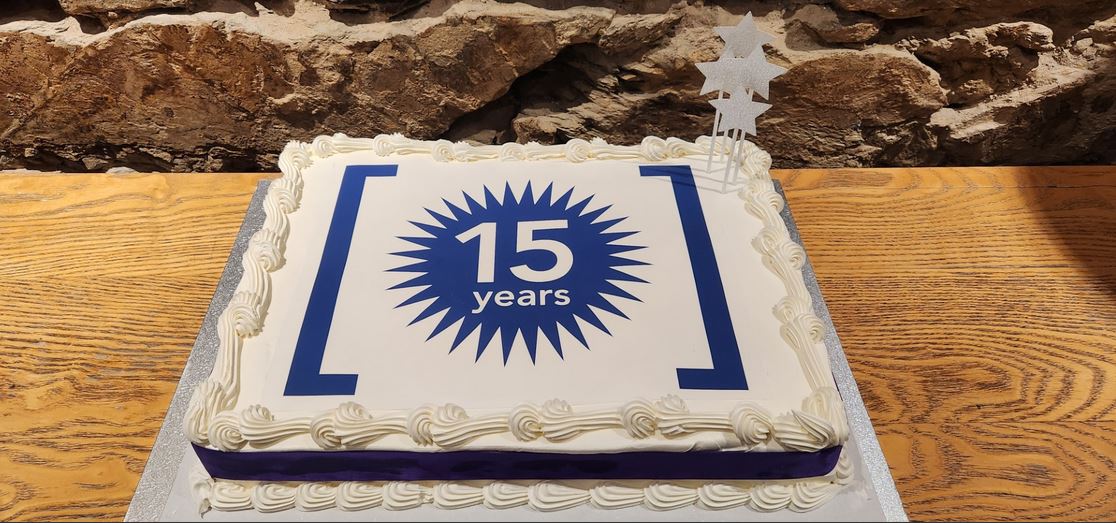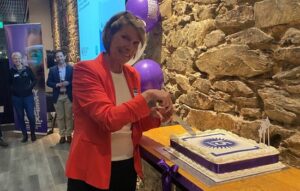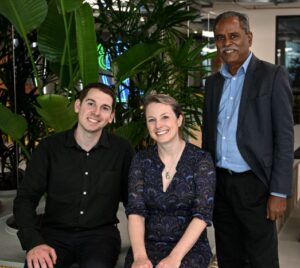
The Medical Device Partnering Program (MDPP) celebrates 15 years at the Flinders University Medical Device Institute at Tonsley, noting the success of two new companies.
The Flinders medical device development labs are open for self-guided tours tomorrow at the University’s Tonsley building, showcasing the world-class facilities supporting biomedical engineering expertise to accelerate product development, education and other research.

For example, MDPP has this year provided about 250 hours of medical device and biomedical engineering expertise to help Melbourne-based start-up Kali Healthcare to develop a novel perinatal care product.
It also has worked another company called OOXii (formerly 4eyesVision) which recently won Australian Good Design Awards 2023 in the Social Impact and Best In Class categories.
Kali founder obstetrician Associate Professor Fiona Brownfoot and partners, engineers Dr Emerson Keenan and Professor Marimuthu Palaniswami, have adapted electrography sensor technology – commonly used for measuring cardiac function in adults – to create a simple, accurate and wearable device that can easily pick up and monitor a baby’s heart rate in utero.
The company, which aims to enhance the care of pregnant mothers and their unborn babies, has now secured funding to develop a wearable pregnancy monitoring device.
The trio approached the MDPP to help develop their proof-of-concept technology into a user-friendly prototype.
This led the team to connect with a valuable startup ecosystem, including ISO13485-accredited development partners, and benefit from expertise at the Australian National Fabrication Facility and links to potential funding opportunities.
“We are so happy and thankful for the support we’ve received from the MDPP team,” says Kali Healthcare CEO Dr Keenan. “From technical aspects right through to commercialisation advice, the MDPP’s contributions to our fetal monitoring device have been extremely helpful and we now have a beautiful prototype to show to our stakeholders.”
Shortly after completing the MDPP program, Kali Healthcare gained a pre-seed investment of $500,000 from University of Melbourne followed by a commitment by LaunchVic’s Alice Anderson Fund and a group of private investors, which lifted the total funding to $1 million.

Overcoming the limitations of conventional cardiotocography (CTG), Kali Healthcare’s fetal monitoring device accurately captures a baby’s heart rate while also providing remote monitoring functionalities. This empowers patients to move about freely and, for those residing in rural or remote regions, enables them to return home while receiving high-quality supervised care with the information transmitted remotely to their healthcare provider.
MDPP director Professor Karen Reynolds, from the College of Science and Engineering and Medical Device Research Institute at Flinders University, is proud of her team’s contribution to the emerging field of fetal electrocardiography (fECG) and for providing assistance to Kali Healthcare in creating its advanced monitoring device.
“MDPP’s extensive range of expertise ensures that visionaries such as Kali Healthcare receive the utmost support in advancing their medical technology,” says Professor Reynolds.
“This fetal monitoring device addresses a crucial clinical need by directly advancing perinatal care.
“This innovation has the potential to reshape the global medical device market, while also championing equitable healthcare for expectant mothers and alleviating strain on healthcare systems around the world.”
Through supporting the development of novel, high-tech medical devices, MDPP facilitates collaboration between researchers, industry, end-users and and government, providing innovators with a solid platform to advance their new product’s potential in a competitive medical devices market.
The MDPP is supported by the SA Department of Industry, Innovation and Skills and MTPConnect’s Researcher Exchange and Development within Industry (REDI) initiative, which allows the MDPP to continue delivering its program nationally. From about 850 enquiries since its inception, the MDPP has conducted 207 workshops and supported 126 projects which have in turn been able to raise about $30 million in commercialisation and R&D funding.
For more information on how MDPP can support projects, visit www.mdpp.org.au

